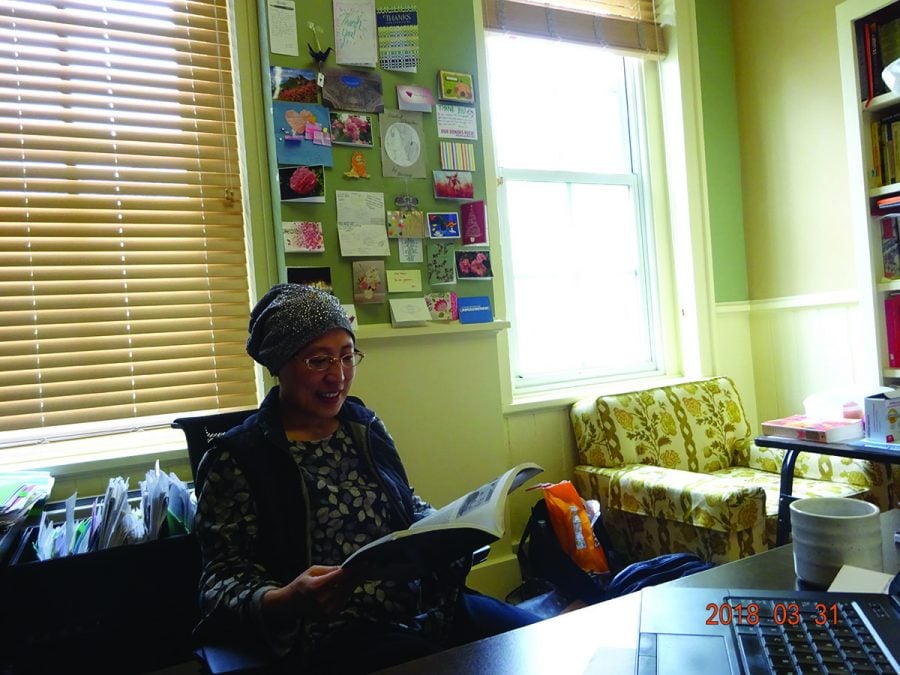Etsuo’s Corner: History professor shares her experiences in China
A portrait of Zhihong Chen sitting in her office during her office hours.//Photo by Etsuo Fujita/The Guilfordian
This week, I interviewed Associate Professor of History Zhihong Chen. She teaches Asian history and I found that she has a unique background and interesting perspective for all students at Guilford.
Here is her story.
“I was born in a peasant family in a small village in northern China. I was studying and helping my family at the same time, which was sometimes difficult for me. There were two significant points in my early life.
“First, my parents had three daughters and no son. In traditional Chinese society, families preferred boys than girls due to gender bias. So in China, at that time, having no son was understood to be a misfortune. So, I studied very hard in order to show a daughter’s worth.
“Second, my father was well educated in my village and collected many books. Even though I did not have any toys, I read a lot of books and the books became an important part of my life. My father and I saw the value of education from the books. My mother, however, was illiterate and my parents married by arranged marriage, so my mother was not very happy about spending money on books because the family was poor.
“After high school, I went to Beijing University. My father was very happy about that because it was difficult for a girl from a village to get into college, and Beijing University was one of the most prestigious colleges in China.
“But two years before I entered the university, the Tiananmen square democracy movement happened. As result, all my classmates and I were required to spend one year in a military academy outside Beijing for political and military training before we started classes on campus.
“After I got my master’s degree, I looked for a chance to study in the U.S. because I wanted to explore the world and gain new perspectives. I was so lucky that I got scholarships from University of Oregon that covered almost all my expenses.
“I studied at the University of Oregon for eight years. Right after I finished a doctoral degree of History in 2008, I started teaching at Guilford.”
We then discussed her opinions about the relationship between the U.S. and China and studying abroad.
“I think both countries are important. They are among the biggest countries and they have a lot to learn from each other. But the reporting about China in the U.S. tends to be negative and China is often portrayed as a threat. Similarly, Chinese propaganda often describes the U.S. in a negative way, so there are many misunderstandings between the two countries.
“Both have their own problems. At the same time, both can benefit tremendously from sharing knowledge, perspectives and resources with each other. As a history teacher, I try to teach students to see issues from more than one perspective.
“I also believe studying abroad is very beneficial for students. Even just going and living in a different place will open your eyes and give you another perspective. Another culture could be a mirror to reflect on your own culture and you can better appreciate diversity.
“In addition, studying as an international student is very challenging. Having to study in a different language and education system might make you feel not very smart. So you might lose confidence. But through the experience, you can recognize the challenges of students who are studying abroad in your country and understand their situations more. I think studying abroad is important and more support for studying abroad programs is needed at Guilford.”
I took her class “Asia Pacific in Modern Times” last semester and learned about Asian history through her and a Chinese perspective. Because I had learned history in Japan through a Japanese perspective, I found a lot of differences in how history is interpreted.
But learning history from a different perspective was a good experience and I learned a lot. I could understand another culture while studying here and opened my eyes and broadened my perspective. Throughout her interview, I also recognized the importance of having more than one perspective and studying abroad.









